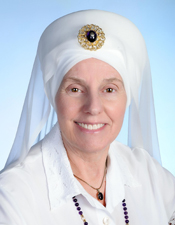Dear Ministers,
As we move into the holiday season, my thoughts turn to two words—gratitude and grace. It seems that no matter what spiritual tradition one might follow, there is usually some kind of special celebration or acknowledgement that accompanies the season. For us, it’s winter solstice. Why do so many honor this time of year? Perhaps, in part, it provides an opportunity to pause, reflect, and appreciate what we do have, who we care about, and what’s important to us.
There is so much darkness in the world now. The drums of war are beating so loudly. It is such an important time to pray, to uplift one’s spirit, and to spread light and love into the energetic field of planet Earth.
Gratitude: a feeling of thankfulness; appreciation for what we are blessed to receive or benefit from. It can be very little things—a smile from a stranger, a child’s giggle, the light turning green as you approach it; to bigger things—a beautiful sunset, food to eat, a place to live, clothes to wear, a bed to sleep in. A very powerful exercise to practice either first thing in the morning or last thing at night is to identify five things you are grateful for in your life. What we focus on we attract—it’s a law of the universe. When we focus on what we don’t want and it shows up in our life, we typically fail to make this connection. When we shift our focus to what we do want, we start the process of receiving it.
As a collective Ministry, what if we focused on healing the polarities that presently exist in our Dharma? What if we looked to that which brings us unity? What if we really do see God in everyone and begin to move towards our sacred soul connection? What would it take to achieve this outcome?
For me, a critical component of effective communication is Grace: “To lift up; a sense of what is right and proper; decency; thoughtfulness towards others; goodwill; respect or reverence used in speaking.” (Webster’s New World College Dictionary, p. 614-615.) Rather than perpetuate position, we might utilize the discovery concepts that the Just Outcomes team shared with us about focusing on interests (i.e. why we want something); cultivating curiosity; and communicating with each other. We have the tools to create a different outcome—we just have to use them!
I invite you to join me in prayer to bless, uplift, heal, and unite our Dharmic family. May your holidays be filled with gratitude, joy, grace, and love.
Humbly,
SS Dr. Sat-Kaur Khalsa
Secretary of Religion
THE SECRETARY OF RELIGION
 SS Dr. Sat Kaur Khalsa has served as Secretary of Religion since 1991 and was ordained as a Sikh Dharma Minister in 1975. As Secretary of Religion, Dr. Sat Kaur oversees and is ultimately responsible for the delivery of the functions of this Office. Dr. Sat Kaur is a long-time member of the International Khalsa Council and the Khalsa Council Executive Committee. She maintains a full-time Telehealth Psychotherapy and counseling private practice, specializing in relationships. She predominately works with adults (individuals and couples) to support their personal and spiritual growth. She is a certified Kundalini Yoga teacher, a facilitator of White Tantric Yoga®, and a published author.
SS Dr. Sat Kaur Khalsa has served as Secretary of Religion since 1991 and was ordained as a Sikh Dharma Minister in 1975. As Secretary of Religion, Dr. Sat Kaur oversees and is ultimately responsible for the delivery of the functions of this Office. Dr. Sat Kaur is a long-time member of the International Khalsa Council and the Khalsa Council Executive Committee. She maintains a full-time Telehealth Psychotherapy and counseling private practice, specializing in relationships. She predominately works with adults (individuals and couples) to support their personal and spiritual growth. She is a certified Kundalini Yoga teacher, a facilitator of White Tantric Yoga®, and a published author.



